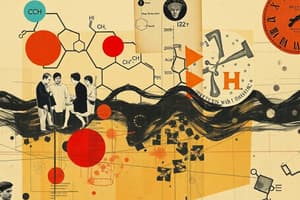Podcast
Questions and Answers
Which type of bond represents a weak chemical bond?
Which type of bond represents a weak chemical bond?
- Nonpolar covalent bond
- Ionic bond
- Covalent bond
- Hydrogen bond (correct)
Which of the following is not true?
Which of the following is not true?
- Water is polar
- Water is the near universal solvent
- Water is hydrophilic
- Water is the most abundant molecule in Earth's atmosphere (correct)
- In solid form, water is less dense than in liquid form
Each carbon molecule can form how many bonds?
Each carbon molecule can form how many bonds?
4
Almost the entire mass of an atom is concentrated in the...
Almost the entire mass of an atom is concentrated in the...
Polar covalent bonds result when valence electrons are shared equally between two atoms.
Polar covalent bonds result when valence electrons are shared equally between two atoms.
Which elements are common to all living organisms?
Which elements are common to all living organisms?
As water vaporizes, energy is _____ from the environment. This process ____ the surrounding environment.
As water vaporizes, energy is _____ from the environment. This process ____ the surrounding environment.
Why is carbon so functional?
Why is carbon so functional?
Define a polar covalent bond.
Define a polar covalent bond.
A __ is a compound that yields hydroxide ions when dissolved in a solution.
A __ is a compound that yields hydroxide ions when dissolved in a solution.
What allows paper clips to float on water, even though it has a greater density?
What allows paper clips to float on water, even though it has a greater density?
If functional groups are removed from a molecule and only hydrogen and carbon remain, you have a...
If functional groups are removed from a molecule and only hydrogen and carbon remain, you have a...
When the number of hydrogen ions increases, the pH...
When the number of hydrogen ions increases, the pH...
What property of water allows it to move across paper towels?
What property of water allows it to move across paper towels?
A __ is a compound that yields hydrogen ions when dissolved in a solution.
A __ is a compound that yields hydrogen ions when dissolved in a solution.
Study Notes
Chemical Bonds
- Hydrogen bonds are weak chemical bonds crucial for many biological processes.
- Ionic bonds form through the transfer of electrons; covalent bonds involve sharing electrons.
- Nonpolar covalent bonds occur when atoms share electrons equally.
Properties of Water
- Water is a polar molecule, allowing it to interact with various substances.
- It is known as the "universal solvent" due to its ability to dissolve many compounds.
- Water is hydrophilic, meaning it has an affinity for water.
- In solid form (ice), water is less dense than in liquid form, which is unusual for most substances.
- Water is not the most abundant molecule in Earth's atmosphere, despite its significance.
Carbon Structure
- Each carbon atom can form four bonds, enabling a diverse range of organic compounds.
- The versatility of carbon stems from its unique bonding capabilities.
Atomic Structure
- The nucleus of an atom contains the majority of its mass, housing protons and neutrons.
Chemical Reactions
- Polar covalent bonds occur when electrons are shared unevenly between atoms, resulting in partial charges.
- Acids release hydrogen ions (H+) in solution, lowering pH, while bases yield hydroxide ions (OH-).
Water Properties
- Energy is absorbed from the environment when water vaporizes, resulting in cooling of the surroundings.
- Surface tension allows objects like paper clips to float on water despite their greater density.
- Water's adhesion property enables it to move across surfaces, such as through paper towels.
Hydrocarbons and Functional Groups
- Removal of functional groups from a molecule leaves a hydrocarbon, composed solely of hydrogen and carbon atoms.
- Functional groups significantly influence the reactivity and properties of organic molecules.
Studying That Suits You
Use AI to generate personalized quizzes and flashcards to suit your learning preferences.
Description
Explore the fundamentals of chemical bonds, including hydrogen, ionic, and covalent bonds, and their role in biological processes. Understand the unique properties of water that make it essential for life, including its polarity and ability to act as a universal solvent. Delve into the structure of carbon and atomic components that contribute to diverse organic chemistry.




